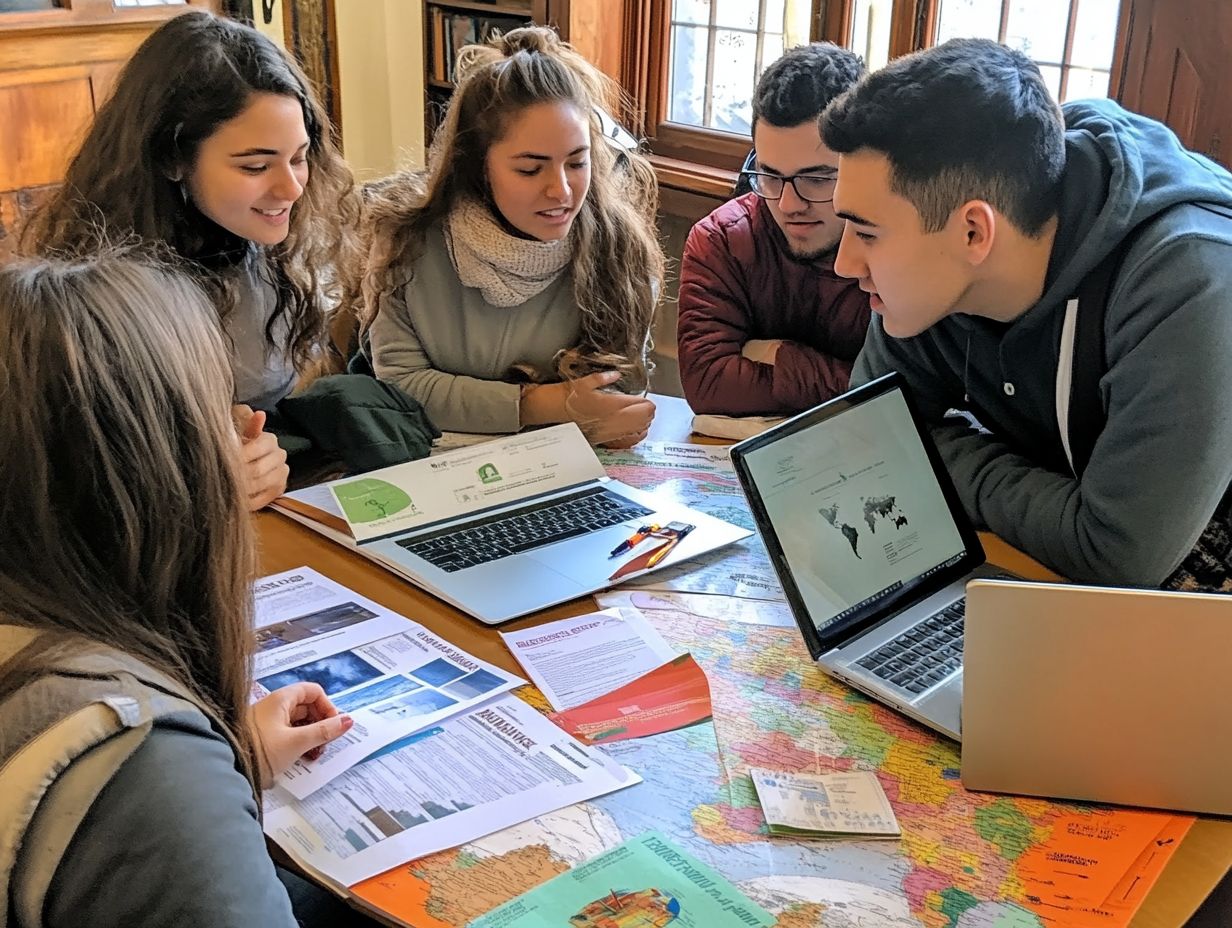The Importance of Financial Aid for Studying Abroad
Studying abroad presents a transformative experience that enriches you academically and personally. However, the costs associated with international education can feel overwhelming.
Let s dive into the exciting financial aspects of studying abroad, covering tuition and living expenses while shedding light on the various types of financial aid available, such as scholarships, grants, and work-study programs.
You will discover guidance on how to apply for this aid, complete with key steps and deadlines. Additionally, we’ll discuss the benefits of receiving financial assistance to turn your global education dreams into reality.
Contents
- Key Takeaways:
- The Cost of Studying Abroad
- Types of Financial Aid for Studying Abroad
- How to Apply for Financial Aid
- Benefits of Receiving Financial Aid
- Frequently Asked Questions
- What is the importance of financial aid for studying abroad?
- How does financial aid support diversity in studying abroad?
- What types of financial aid are available for studying abroad?
- Can financial aid be used for all study abroad programs?
- How can students apply for financial aid for studying abroad?
- Can students receive both financial aid and scholarships for studying abroad?
Key Takeaways:

- Studying abroad can be a valuable experience, but it comes with a high cost.
- Financial aid, such as scholarships, grants, and work-study programs, can help alleviate the financial burden of studying abroad.
- It is important to research and apply for financial aid early; it can greatly enhance opportunities for studying abroad while reducing financial stress.
Why Studying Abroad is a Valuable Experience
Studying abroad is an invaluable opportunity for you as an American student. It allows you to expand your view of the world and elevate your academic performance.
By immersing yourself in diverse cultures, you ll gain unique perspectives that enrich your educational journey. This transformative experience fosters personal growth and equips you with essential skills that employers are actively seeking in today s global job market.
Attending an international university can significantly enhance your understanding of global issues, languages, and professional networks. The study abroad experience is a crucial part of modern education.
Through participation in carefully designed international exchange programs, you can uncover various funding options that make these enriching experiences more accessible. These opportunities enhance your academic pursuits and facilitate valuable networking with peers and professionals from around the world.
The adaptability and cultural competence you gain from living in a different country play a vital role in your personal development. You will boost your confidence and independence.
Ultimately, the impact on your academic trajectory is profound, crafting a more competitive profile as you pursue advanced studies or enter the workforce.
The Cost of Studying Abroad
The cost of studying abroad can fluctuate considerably, influenced by the international university you choose, the specific program tuition, and the living expenses in your host country. As an American student, it s essential to account for various expenses, including tuition fees, housing, health insurance, and daily living costs, which can accumulate swiftly.
Understanding the costs of studying abroad is crucial. It helps you plan your finances and enjoy a rewarding educational journey.
You should also explore funding options like FAFSA (Free Application for Federal Student Aid), scholarships, and grants that can help lighten your financial load.
Start your journey today! Research financial aid options and let your dreams of studying abroad come true!
Tuition, Living Expenses, and Other Expenses
When you’re planning to study abroad, it’s crucial to understand tuition fees and related costs so you can budget effectively. Tuition fees can vary significantly between international universities. Don t forget to factor in additional costs like health insurance, housing, and daily living expenses.
Start your research early to sidestep any financial surprises during your study abroad adventure. Exploring financial assistance options, such as scholarships and federal student aid, can provide essential support in managing these expenses.
A detailed breakdown of living expenses will show you that accommodation can take a hefty bite out of your budget. You ll have options ranging from on-campus dormitories to off-campus apartments. Remember to consider utilities, internet, and those pesky monthly housing-related bills.
Food costs can also fluctuate based on your dietary preferences and whether you choose to cook at home or dine out. Plus, transportation expenses are another piece of the puzzle; think of public transit passes, bike rentals, or even the possibility of owning a vehicle, depending on your location.
By using budgeting tools such as apps or spreadsheets, and consulting financial planning resources, you can craft a strategy that helps you navigate these costs confidently.
Types of Financial Aid for Studying Abroad

American students exploring study abroad opportunities have a wealth of financial aid options to help alleviate the costs associated with their programs. These funding avenues include scholarships, grants, federal student aid, private loans, and work-study programs. All of these can substantially lessen the financial strain of studying overseas.
By understanding the various types of financial aid available, you empower yourself to make informed decisions about your educational funding. This paves the way for a more seamless financial experience throughout your studies.
Scholarships and Grants
Scholarships and grants are essential financial lifelines for you as an American student aspiring to study abroad. They offer funding that you won’t have to repay, providing significant relief.
Numerous educational foundations and nonprofit organizations offer study abroad scholarships specifically tailored to support your pursuit of international education. Federal grants like the SEOG Grant can help offset tuition fees and living expenses, making your global adventure more financially manageable.
You’ll find a variety of scholarships and grants available, catering to different fields of study, demographics, and levels of financial need. For example:
- The Fulbright Program offers graduate students and professionals opportunities to conduct research or teach in other countries.
- The Benjamin A. Gilman International Scholarship is designed for undergraduates receiving federal Pell Grants, encouraging those with limited financial resources to explore global education opportunities.
Keep in mind that applying for these programs typically involves submitting essays, recommendation letters, and proof of academic accomplishments. This highlights the importance of planning ahead.
Resources like the Education Abroad offices at universities and websites such as GoAbroad.com can be invaluable in guiding you toward suitable funding options. This makes your journey toward global education much more attainable.
Consider reaching out to local community resources or support groups that can assist in your study abroad journey, fostering a sense of community.
Student Loans
Student loans serve as a vital financial resource for American students looking to study abroad. They provide essential funding for tuition and living expenses.
Options like federal student aid, which includes Direct Subsidized and Unsubsidized Loans, typically offer more favorable repayment plans and lower interest rates compared to private loans.
While private loans can provide larger amounts, they often come with higher interest rates and less flexibility in repayment. As you go through the application process, it s wise to fill out the Free Application for Federal Student Aid (FAFSA) to unlock access to federal aid. This can lead to a variety of grants and loans.
Understanding different repayment plans such as income-driven repayment options and forgiveness programs is crucial for minimizing long-term financial burden. Each loan has its specific terms and conditions, making it essential for you to carefully review and compare these options before making a commitment. This ensures you choose the most advantageous path for your educational journey.
Work-Study Programs
Work-study programs present you with a remarkable opportunity to earn financial aid while gaining invaluable work experience during your study abroad. These programs enable you to balance your academic commitments and part-time jobs, often closely related to your field of study.
This not only enhances your educational funding but also supports your student account. Engaging in work-study can positively influence your academic performance by helping you hone essential time management and organizational skills.
These initiatives offer exciting opportunities, ranging from on-campus roles to internships within relevant industries. This allows you to apply classroom knowledge to real-world scenarios.
Eligibility criteria generally include financial need and enrollment status, making the process attainable for many students. The application process usually involves completing the FAFSA, where you can indicate your interest in work-study options.
Ultimately, participating in these programs not only eases financial burdens but also equips you with critical skills and connections that foster career readiness as you approach graduation.
How to Apply for Financial Aid

Applying for financial aid requires understanding the application process and the array of resources available to American students intending to study abroad. You need to navigate from completing the FAFSA to adhering to scholarship and grant application deadlines, taking a proactive stance in securing the financial assistance you seek.
By engaging with the financial aid office at your home institution, you can gain invaluable insights and ensure you are aware of all potential funding options for your international education journey.
Steps to Take and Important Deadlines
To successfully apply for financial aid, students in America need to navigate a series of essential steps and adhere to important deadlines throughout the process. This begins with completing the FAFSA, which determines eligibility for federal student aid.
It s also vital to research available scholarships and understand the specific deadlines for each funding option. Engaging with the financial aid office at your institution can provide invaluable resources to help you through this journey.
Diligence is key when gathering the necessary documentation, such as tax returns and personal identification, which are critical for completing the FAFSA and other applications.
Establishing a timeline that highlights key dates like submission deadlines for federal and state aid, as well as application periods for various scholarships ensures that you won t miss out on any opportunities.
Staying informed about the requirements for each funding source is crucial since they can vary from one program to another. This proactive approach maximizes your chances of successfully securing financial assistance.
Don’t wait! Start your financial aid journey today!
Benefits of Receiving Financial Aid
Receiving financial aid can significantly reduce the financial burden of studying abroad. This support makes international education more attainable, allowing you to focus on your educational experience rather than financial worries.
Such assistance opens doors for both personal and academic growth. You can immerse yourself in your study abroad program without the heavy weight of financial stress looming over you.
Reducing Financial Burden and Enhancing Opportunities
Financial aid plays a crucial role in easing the financial strain you may encounter while pursuing study abroad opportunities. It provides access to educational funding that might otherwise seem unreachable.
Scholarships and federal student aid programs can significantly lower tuition and living expenses. This allows you to concentrate on your academic and personal development.
This financial support enriches your experience by enhancing opportunities for cultural exchange, academic success, and professional networking. Your study abroad journey becomes not only feasible but also profoundly rewarding.
Get excited! Programs like the Fulbright Scholarship and the Gilman International Scholarship offer targeted financial assistance, often covering travel costs and essential living expenses. These initiatives enable students from diverse backgrounds to access resources that make international study possible.
Grants and fellowships available through various educational institutions act as vital support systems. They ensure that even those with limited financial means can partake in transformative experiences abroad.
Ultimately, these funding opportunities cultivate a generation of globally-minded individuals. They are ready to tackle challenges and make meaningful contributions to their communities.
Frequently Asked Questions

What is the importance of financial aid for studying abroad?
Financial aid can greatly impact a student’s ability to study abroad. It provides essential funds for expenses such as tuition, housing, and travel. Without this assistance, many students may struggle to afford the high costs associated with studying abroad.
How does financial aid support diversity in studying abroad?
Financial aid makes studying abroad an option for students from all socio-economic backgrounds. This promotes diversity and encourages cultural exchange, allowing students to explore different countries and share experiences with others.
What types of financial aid are available for studying abroad?
There are various types of financial aid available, including scholarships, grants, loans, and work-study programs. It is crucial for students to research and apply for all available options to help cover the costs of their study abroad programs.
Can financial aid be used for all study abroad programs?
Financial aid can be applied to most study abroad programs, including semester, year-long, and summer options. Students should check with their specific program and financial aid office to ensure their aid can be used.
How can students apply for financial aid for studying abroad?
Students can apply for financial aid through their college or university’s financial aid office. Additional applications or paperwork specific to their study abroad program or scholarship opportunities may also be required.
Can students receive both financial aid and scholarships for studying abroad?
Yes, students can receive both financial aid and scholarships. It is essential to check with the financial aid office to understand how these may affect each other and the overall funding for their program.
Curious about how financial aid can change your study abroad experience? Let s dive in!
Explore your options today and make your dream of studying abroad a reality!






